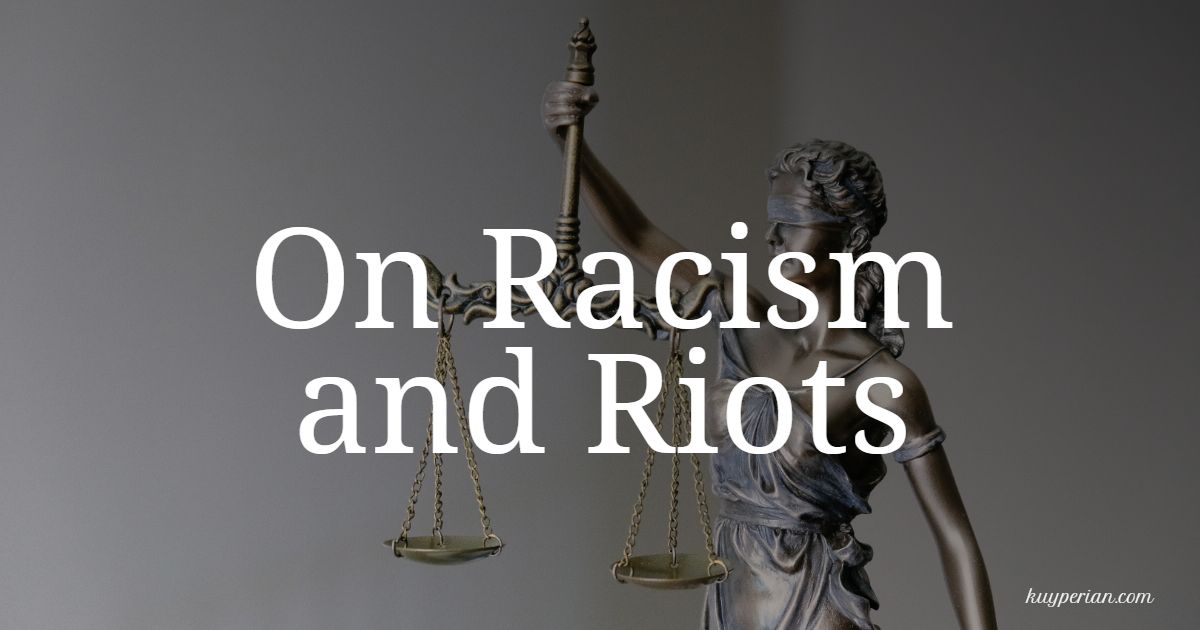Racism and rioting have long been part of our history. Our descent into unrighteous acts by those in authority and those who perpetrate pain by destructive acts is an indication of the times. We prefer revolution before regeneration, and as a result we suffer societal decay. It is easier and expedient to take on the eschaton now than to wait for justice to flow in due time. Our instincts are to enact our kingdoms at this very moment, and thus we advance our agendas with no recourse to dialogue.
We should cry our for justice as the Psalmist, but even when we claim we have not been heard, the solution must not be to enact on unscrupulous anger. If we do, we perpetuate the instrumentation of evil and nothing changes. We are all aware that brutality and racism exists in all spheres of society, and our assessment confirms these things again and again. It’s our human reaction to find fault and to indict an entire group of human beings before justice is fully executed. But when we interfere with the process through unethical means, civility suffers and progress in dialogue is stifled.
Excursus on Bonhoeffer
The name of Dietrich Bonhoeffer immediately comes to the front of such conversations. For Bonhoeffer, in his work Ethics, he notes the importance of the community habits as formative in society and to do right was a prerequisite for public life. It’s imperative to note that it wasn’t until 1943a that Bonhoeffer was arrested due to documents linking him to a conspiracy to kill Hitler. Hitler came into power 10 years earlier. Bonhoeffer did not seek to interfere in a physical way until all other options were exhausted. For the Lutheran pastor, civil disobedience was an option but not the first option.
In our day, we have descended into ethical immorality and are poorer as a result. We have made revolution the excuse of the masses. We should be grateful that we are already experiencing some justice in modern cases of abuse of power. No king or police officer is above the law.
Root of Racism
Racism exists because certain humans are content in their towers of Babels. They are satisfied investing in their kingdoms with one speech and one way of doing things. When the outsider begs for entrance, the racist exerts his ideological muscles and fights for his land and language. He argues that any other culture is forbidden and to show off his prowess he may use violence. The Gospel is contrary to this in millions of ways, but central to the Gospel’s thesis is the promise of reconciliation in Jesus Christ.
The Church is called to forsake the tower of Babel and scatter themselves among every tribe, language and people. Racism and riots are byproducts of people who failed to heed the call to be ambassadors of peace. Again, revolution is easier than regeneration; desperate acts are more visible than dialogical ones.
The Church’s role is a long-term strategy. She must embody habits that diminish the very possibility of incivility in her midst. She cannot stand for the voice that diminishes the humanity of others, and she cannot act as the avenger. Vengeance belongs to the Lord. We cannot fall prey to the temptation to disrupt justice by injustices. When we claim that injustice was done, however heinous, our response is to settle our hearts in the sovereign benediction of the Spirit of Pentecost who does all things well, and begin the long and arduous task of petitioning the justice of God through his magistrates and offer the world acts of charity and words of life.
- In October 1940, Dietrich Bonhoeffer began work as an agent for Military Intelligence, supposedly using his ecumenical contacts to help the cause of the Reich. In reality, he used his contacts to spread information about the resistance movement. (back)
















